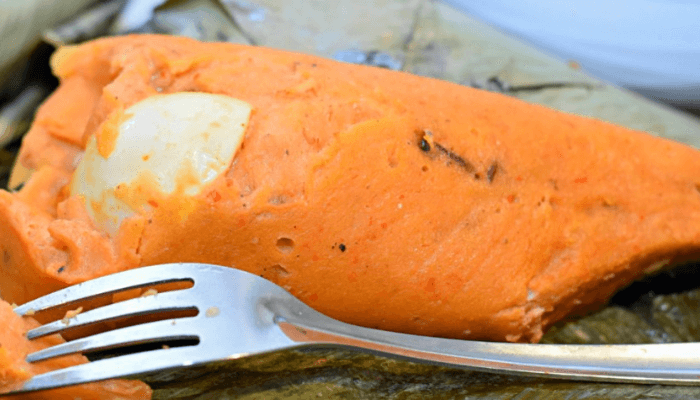My first interaction with the word ‘Olele’ was in the early 1990s, when it was very common and rang like a bell in the streets of Lagos, Ibadan, and some Southwestern cities.
Moi–moi, as a word, later overtook or, I would say, overshadowed Olele as the years went by, and to date, many of us describe this street snack and food as moimoi.
Years later, as I travelled round the South East, the word Mai-Mai or Mayi-Mayi stood out, as I saw how some early morning hawkers in many parts of the South East earned a livelihood through the sale of Mai-Mai, but the real word is Moi Moi.
In the bustling streets of Lagos, at traditional Yoruba ceremonies in Ibadan, and on breakfast, lunch and dinner tables across Nigeria, one dish continues to hold a cherished place on many cultural and traditional tables, this is Moi–Moi.
Also known as Moin-Moin, Ole, or Olele, this steamed or boiled bean pudding has transcended its humble roots of being a popular and cherished street food to become a culinary staple across West Africa, Africa and the global space. This is because Nigerians, who have migrated to other parts of the world, have journeyed with this culinary heritage.
Made basically from washed and peeled beans, blended with onions, peppers, herbs, spices, and enriched with additions such as fish, eggs, dry or fresh shrimps or crayfish, olele remains a protein-enriched delicacy that embodies culture, nourishment and tradition.
Well, many believe that Moi Moi is deeply associated with the Yoruba of southwestern Nigeria, though it has spread far beyond its origins to become a beloved meal across the country and West Africa. It’s called ilele in Igala. The Hausa describe this food as Alele, while the Igbos will readily say Elele, Elele-Iko, Ikpipke – Komkom, and Elele agwa. Historically, reports say today, former Yoruba slaves in Brazil and Sierra Leone still eat it, and they call it either Moin-Moin or Olele. Same for other Yoruba-linked tribes in Ghana and Gambia.
Traditionally and culturally, Moi-Moi is cooked, steamed or boiled in broad leaves, traditionally known as Ewe Eran (Thaumatococcus daniellii) or even banana leaves. This is not just flavourful, but quite medicinal and healthy, especially because the leaves have their unique health benefits, which contribute to the food and the body.
In blending, mixing and preparing the Olele pudding, as well as culturally, being scooped into the wrapped leaves, they take on these unique pyramid or cone shapes, even after passing through the heat or the fire, from the village firewood and charcoal fires.
Moi -Moi, as a dish, is versatile. It is eaten alone as a snack, sometimes with Eko or Agidi [thickened pap pudding] or paired with rice (this can be Jollof, fried or white rice), or even served with pap (ogi, akamu or koko), custard, or even taken alongside garri.
From street vendors to weddings and festive occasions, Olele has retained its prestige as both everyday food and celebratory cuisine. In contemporary times, metal tins, foil wrappers, or plastic bowls have become popular alternatives, yet many still argue that the smoky, earthy aroma imparted by leaves gives Moi-Moi its most authentic taste.
Health-wise, we are strongly advised to avoid the use of plastic and foil wrappers, because they emit toxins that poison our food. This narrative has been trending for some years now. We are told to avoid using plastic or foil to cook moimoi because heating plastic releases harmful chemicals like BPA and phthalates into our food, and foil may not be food-safe or may leach into the food.
The best, therefore, remains our traditional, cultural and natural alternatives – moi moi leaves and others, because they are healthy and add a unique flavour to our food, although some still assert that food-safe options like glass bowls, aluminium foil pouches, or reusable moi moi pouches can equally be used. As for me, I prefer the leaves!
The cultural symbolism and identity of Moi-Moi is not just in terms or snack or food, it is a cultural marker. It symbolises hospitality, celebration, and identity within the Nigerian society. At weddings, birthdays, and community gatherings, the dish is often served in large quantities, signifying abundance and unity. It also represents creativity in African culinary traditions. The ability to fashion cooking containers from leaves, tie them neatly into shapes, and steam the pudding to perfection reflects indigenous knowledge systems and sustainable practices that predate modern packaging. Our mothers and daughters, food vendors, food sellers, snack and street food lovers have all drawn culinary strength and vitality from this beans pudding.
Lets take a swipe at the nutritional value and health benefits of this unique Nigerian street food and home delight. Beyond its cultural significance, Moin-Moin is a nutritional powerhouse.
It is rich in protein: Its primary ingredient, beans, provides essential plant-based protein vital for muscle development, tissue repair, and overall body strength.
It is packed with fibre, which aids digestion and helps maintain a healthy gut.
Vitamins and Minerals are part of this food. With ingredients like onions, peppers, shrimps, crayfish, and eggs, the dish provides iron, magnesium, vitamin B6, and antioxidants that support immunity and blood health.
It is low in fat owing to its steamed preparation. This simply means that the use of minimal oil as required makes it a healthy alternative to fried snacks.
The heart health advantage is vital because beans are known to lower cholesterol levels, reducing the risk of cardiovascular diseases.
For children, Olele provides a balanced, energy-giving meal and for adults, this food or snack is a wholesome option that promotes wellness without excess calories. Its versatility also allows for vegan-friendly variations by excluding animal protein while retaining its full nutritional profile.
As conversations therefore grow about preserving Nigeria’s rich culinary, cultural traditions, Moi-Moi stands as a strong candidate for recognition on the UNESCO Intangible Cultural Heritage list. The reasons are not far-fetched:
Cultural Continuity: For generations, Moin-Moin has been passed down through oral tradition, recipes, and communal cooking. Its preparation is often a collective activity, strengthening family and community ties.
Sustainability: Using our traditional, natural leaves and local ingredients aligns with UNESCO’s emphasis on sustainable heritage practices.
Culinary Uniqueness: While other cultures have bean-based dishes, the steaming technique, use of leaves, and Nigerian-style seasoning make Olele distinct.
Representation of Nigerian Identity: Moi-Moi is both traditional and modern, since it connects the past to the present, showing how indigenous dishes adapt to new contexts without losing their authenticity.
Recognition by UNESCO would not only protect Moin-Moin as a cultural treasure but also spotlight Nigeria’s culinary excellence on a global stage.
Moi-Moi is more than bean pudding. It is nutrition, history, creativity, and heritage wrapped into one leafy dish. It tells the story of Nigerian tradition, heritage, culture, naturalness, resilience, innovation, and hospitality. From its humble beginnings in Yoruba kitchens to its prominence at national events, Moi-Moi continues to nourish both body and culture.
As Nigeria pushes for the global recognition of its cuisines, Moi-Moin stands tall as a delicacy worthy of UNESCO’s Intangible Cultural Heritage list—a culinary gem the story of which deserves to be preserved and celebrated for generations to come.









